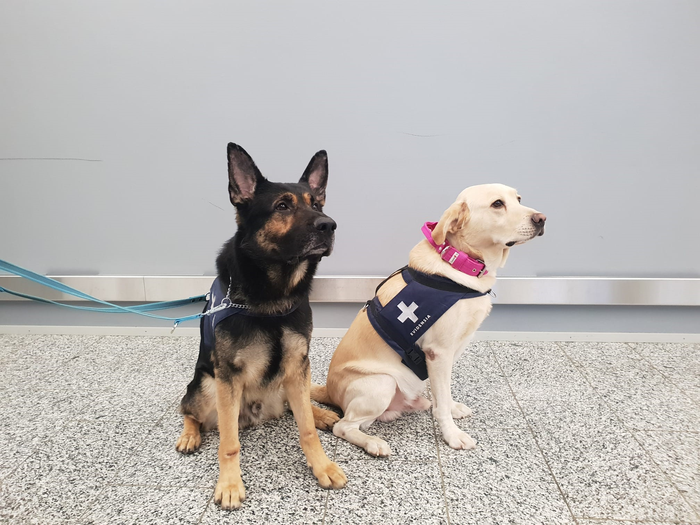Dogs trained to detect SARS-CoV-2 can sniff out infected passengers at airports

In a current analyze printed in the journal BMJ Global Overall health, researchers explored no matter if scent canine can be properly trained to establish serious acute respiratory syndrome coronavirus 2 (SARS-CoV-2)-contaminated persons.
Experiments have described that puppies have really delicate olfactory units with their limit of detection exceeding the diagnostic capability of latest laboratory devices. It is presumed that dogs can detect distinctive volatile organic and natural compounds (VOCs) that are produced by the metabolic pathways of their hosts in parasitic, bacterial, and viral bacterial infections. The scent doggy strategy is especially pleasing for coronavirus sickness 2019 (COVID-19) screening in public locations and amid masses of airport passengers.
Review: Scent canines in detection of COVID-19: triple-blinded randomised demo and operational serious-daily life screening in airport environment. Corona detection puppy Silja at the Helsinki-Vantaa airport. Picture Credit rating: Egil Björkman
About the analyze
The scientists of the present research estimated the diagnostic accuracy [specificity, sensitivity, negative predictive value (NPV), and positive predictive value (PPV)] of scent canine SARS-CoV-2 identification when compared to reverse transcription-polymerase chain reaction (RT-PCR). In addition, the variant position of the SARS-CoV-2 an infection was identified making use of bioinformatics assessment and genomic sequencing.
In spring 2020, the authors began to teach canines to detect SARS-CoV-2-infected samples and, subsequently, in autumn, they commenced operational SARS-CoV-2 screening at the Helsinki-Vantaa Worldwide Airport.
In this report, they presented the results of their review, which comprised (1) puppy instruction, (2) a randomized, future, triple-blinded research with 4 canine, and (3) a possible, authentic-daily life analyze with the exact pet dogs for routinely screening arrival passengers. The screening comprised pet scent detection exams and nasopharyngeal swab RT-PCR assessments carried out simultaneously.
The examine participants had been (1) inpatients, (2) balanced people today, and outpatients who ended up telephonically contacted or who approached the analysis group in response to advertisements that have been posted at RT-PCR assessment stations in the vicinity of Helsinki, and (3) arrival travellers and airport staff.
Men and women with a SARS-CoV-2-detrimental RT-PCR report executed within just a few days of vacation were being not examined once again. The participants stuffed out questionnaires to get information on their demographics, COVID-19 symptoms, and RT-PCR check stories. Personalized interviews and digital health care records of hospitalized COVID-19 patients had been also utilized.
A cubicle was specifically constructed at the arrival terminal and was utilized for the study. The cubicle comprised three rooms for skin swab sampling of arrival passengers and a pet operating region with sliding hatches on the walls for tracks and samples.
Four puppies were properly trained for SARS-CoV-2 detection from pores and skin swabs. The controlled triple-blinded validation review comprised four similar sets of 420 parallel samples (from 114 RT-PCR-optimistic and 306 RT-PCR-detrimental people), randomly offered to every single dog about seven validation sessions (VALI-7). The dogs screened pores and skin swabs from 303 incoming travellers, all concomitantly examined by nasal swab RT-PCR.
The dogs ended up qualified at a schooling centre and subsequently in the airport’s objective-created cubicle working with operant conditioning by expert canine scent detection trainers. For each individual validation examine session, 4 dogs were made use of and 60 cans have been arranged for just about every pet dog as follows: each individual zip lock bag that contained the test sample was opened, and gauze was eliminated from the bag using sterile tweezers and transferred into a can which was lined with a a person-liter plastic freezer bag. The cans ended up subsequently loaded onto scent tracks based on a pc-generated randomization record, following which the tracks had been moved to the examine cubicle with the assistance of a trolley.
The true-everyday living operational review was carried out in between September 23, 2020, and April 30, 2021. In full, 10,119 persons (travelers and airport staff members) participated in the review, ensuing in 48 (.5%) samples indicated as good, a portion of which have been utilized for the validation study.
Benefits
In the validation examine, the over-all diagnostic accuracy of dog scent detection was 92% sensitivity and 91% specificity as opposed to RT-PCR. Primarily based on the prevalence of SARS-CoV-2-favourable samples in the examine (27%), the total PPV was 84% and NPV was 96%.
In the possible, real-everyday living airport placing review, scent doggy detection and RT-PCR prognosis matched 99% of the destructive swabs. Scant airport prevalence (.5%) did not let sensitivity screening nevertheless, the advert hoc evaluation, together with predefined favourable SARS-CoV-2 S samples showed 98% diagnostic accuracy.
Failure to detect a SARS-CoV-2-beneficial sample was linked with the SARS-CoV-2 Alpha variant [Alpha versus wild-type odds ratio (OR) =14]. The scent canines recognized 89% of the wild-sort-contaminated samples the right way but only 36% of the Alpha-infected samples.
The concomitant existence of long-term health conditions, the time interval concerning symptom onset and sample assortment, the time elapsed because the RT-PCR take a look at, and individual age ended up not related with SARS-CoV-2 scent puppy detection failure.
General, the examine findings showed that educated scent dogs could be a useful adjunct to RT-PCR for COVID-19 screening at airports with higher diagnostic accuracy. In addition, the scent dog method could be specifically beneficial for mass screening for SARS-CoV-2 infections on a massive scale, although continuous pet dog instruction is necessary for the detection of SARS-CoV-2 variants by scent puppies.
Journal reference:
- Kantele A, Paajanen J, Turunen S, et al. Scent pet dogs in detection of COVID-19: triple-blinded randomised demo and operational authentic-lifetime screening in airport placing. BMJ International Wellness 20227:e008024. doi:10.1136/ bmjgh-2021-008024, DOI: 10.1136/bmjgh-2021-008024, https://gh.bmj.com/information/7/5/e008024







